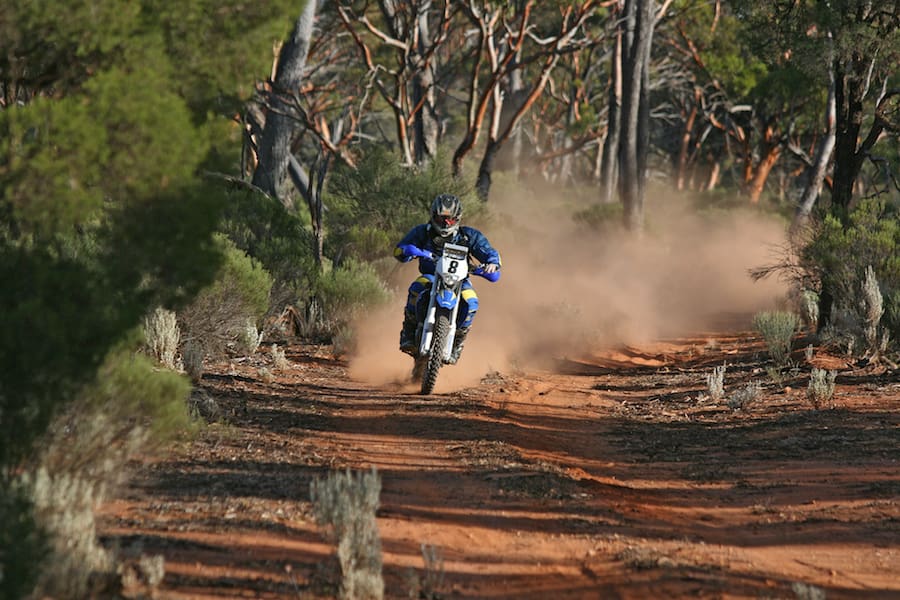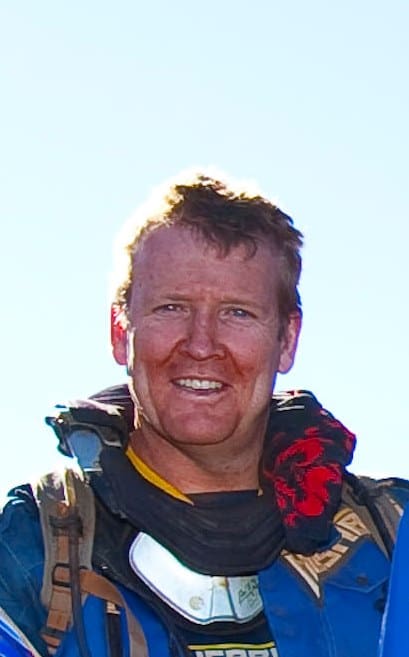Andrew Coaker was the first Aussie privateer to take on the Dakar Rally
Andrew Coaker was among the scores of youngsters competing in the growing enduro scene in the 90s when he was invited to navigate his cousin John’s Toyota Ute in the Wynn’s Safari. The pair scored a podium and, though he didn’t take to the confines of a cab, ‘Coak’ was intrigued by the idea of cross-country racing.
On returning home, he immediately slapped a monstrous fuel tank and a map roller on his KTM620 and prepared for the nine-day Adelaide to Townsville Safari. He finished eighth outright and won two stages along the way, a result that convinced him to head off to Europe, the headquarters for world cross-country rallying.
Aged just 24, in 1998 Coaker became the first Aussie privateer to take on the Paris Dakar Rally. Not only was he among the mere 30 per cent of competitors to finish, he scored a podium in the Marathon Division, where riders are denied any servicing or mechanical assistance.
“However, my greatest challenge was the inability to understand French” he recalls. “Briefings went on for 30 minutes followed by a five-minute review in English. On one occasion we were instructed to stick to the main track between Mali and Mauritania. I only found out later that was because we had to traverse a minefield.”
GPS was first introduced to the Paris Dakar that same year and was Coaker’s first exposure to the navigation system, which decreased the risk of getting lost. However, the biggest danger was the chance of being target practice for the locals.
“Several auto competitors were ambushed and looted by Tuareg Rebels,” he recalls, “and one bloke who decided not to stop finished the stage with no less than seven bullet holes in the car and two flat tyres.” Possibly the rebels figured the moto riders were only capable of carrying loose change and Coaker survived.
His achievement was somewhat overshadowed by fellow Aussie Andy Haydon providing KTM with its first outright Dakar podium. Nevertheless, his effort did not go unnoticed by Husaberg and later that year he became our first international rally star, signing a three-year contract with the Austrian-owned Swedish brand to contest the FIM World Cross-Country Rally Championship.
Developing a new bike against established teams such as Yamaha, BMW and KTM proved a monumental task, but racing in exotic locales such as the Spanish Monegros mountains, the jungles of Brazil, the steppes of Russia and the deserts of Morocco, Tunisia and the United Arab Emirates provided a compelling lifestyle.
“The FE600 Husaberg was light and fast, but lack of reliability was its downfall. Electrical problems caused by overheating stators were so common we had to carry spares in our backpacks.”
DNFs were frequent, but in winning the prologue of the 2000 UAE Desert Challenge – followed by a top-10 finish – Coaker became the first Aussie to score Cross-Country Championship points. Sadly it wasn’t enough to keep Husaberg in the game because KTM was about to embark on an indomitable winning streak that lasted 15 years.
With some assistance from KTM Australia, Coaker purchased a KTM660 Rallye on which he finished sixth in the 2001 FIM World Cross-Country Rally Championship, despite missing the final two rounds due to work commitments.

Dakar beckoned in 2004, but a heavy crash on Day 8 resulted in five broken ribs. Despite his injuries, he battled on over the final nine days and finished a creditable 25th outright.
Coaker returned to Australia in 2005 and the revival of the Australian Safari in Western Australia in 2007 was all he needed to dust off his boots and join young gun Ben Grabham on the GHR Honda Team. He was leading until a navigation error cost him 19 minutes and the chance of a podium.
He had all but retired by 2009, but intrigued by Husaberg’s 70° ‘sloper’ powerplant he had another shot at the Safari and earned
a top-10 spot. He also scored a podium in the inaugural Yilgarn cross-country rally.
Coaker, now married with three children, works as a project director for ANZ in Sydney and has to suffer the inevitable anti-bank brickbats instead of victory bouquets.
“I still love riding but seldom get the opportunity, and the only bike in the garage is five-year-old Jonty’s TTR50.”
By Peter Whitaker
As published in AMCN Vol 67 No12.
